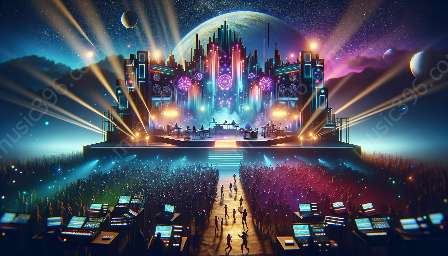Electronic music has a rich history that has significantly shaped the future of music and influenced contemporary culture. From its early experimentation with electronic devices to the global phenomenon it has become today, electronic music continues to evolve and innovate.
The Birth of Electronic Music
The origins of electronic music can be traced back to the late 19th and early 20th centuries. The invention of the electronic oscillator and the development of the theremin by Léon Theremin in the 1920s were pivotal moments in the history of electronic music. These early electronic devices paved the way for artists and composers to explore new sonic possibilities.
Electronic Music in the 1950s and 1960s
The 1950s and 1960s saw a surge in the experimentation and development of electronic music. Composers such as Karlheinz Stockhausen and Pierre Schaeffer made significant contributions to the genre with their innovative use of electronic devices and tape manipulation techniques. The emergence of the Moog synthesizer in the 1960s further revolutionized the production of electronic music, leading to a new era of electronic sound creation.
The Rise of Electronic Dance Music
Electronic dance music (EDM) gained prominence in the late 20th century, particularly in nightclubs and raves. Genres like house, techno, and trance became synonymous with electronic music culture, attracting a global following. The integration of electronic music production with DJ culture and live performances propelled EDM into the mainstream, influencing popular music and modern music production techniques.
The Influence of Technology
Advancements in technology have played a crucial role in the evolution of electronic music. The development of digital audio workstations (DAWs), synthesis software, and hardware synthesizers has empowered artists to create and manipulate sound in ways that were previously unimaginable. The accessibility of production tools has democratized music creation, allowing a diverse range of artists to explore electronic music genres and push the boundaries of sonic experimentation.
Electronic Music in Contemporary Culture
Today, electronic music has permeated various facets of contemporary culture, from mainstream pop music to avant-garde experimental compositions. Festivals dedicated to electronic music, such as Tomorrowland and Ultra Music Festival, attract millions of fans worldwide, showcasing the global appeal of electronic music. Additionally, electronic music continues to inspire cross-genre collaborations and interdisciplinary artistic expressions, blurring the boundaries between electronic, classical, and popular music.
The Future of Electronic Music
The future of electronic music holds endless possibilities, driven by technological innovation and the creative visions of artists. As artificial intelligence and machine learning continue to converge with music production, new forms of sonic exploration and interactive performances are likely to emerge. Virtual reality and augmented reality platforms also offer exciting opportunities for immersive electronic music experiences, redefining the relationship between music, technology, and audience engagement.
Conclusion
The history and evolution of electronic music have irrevocably shaped the landscape of modern music. From its humble beginnings as an experimental pursuit to its current position as a global cultural phenomenon, electronic music has continually pushed the boundaries of sonic expression. As we look towards the future, electronic music stands poised to redefine the very nature of musical creation and interaction, ensuring its enduring impact on the course of music history.


